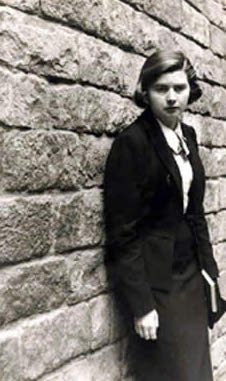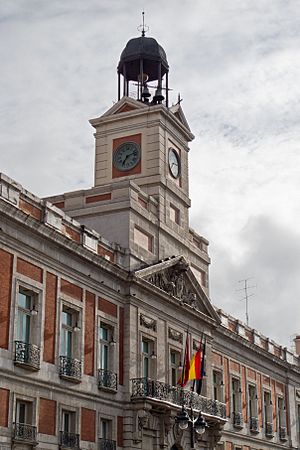Eva Forest facts for kids
Quick facts for kids
Eva Forest
|
|
|---|---|

Forest in 1951
|
|
| Born | 6 April 1928 Barcelona, Spain |
| Died | 19 May 2007 (aged 79) Hondarribia, Spain |
| Pen name | Julen Agirre |
| Genre | Political literature |
| Spouse |
Alfonso Sastre
(m. 1955) |
| Member of the Senate of Spain | |
| In office 13 May 1992 – 13 April 1993 |
|
| Constituency | Gipuzkoa |
| Personal details | |
| Political party | Herri Batasuna |
Genoveva Forest Tarrat (April 6, 1928 – May 19, 2007) was a Spanish writer, activist, and political prisoner. She came from an anarchist family in Barcelona and studied medicine in Madrid. In the 1970s, she supported the Basque group ETA in their fight against the government of dictator Francisco Franco. From 1974 to 1977, she was imprisoned. After Spain's move to democracy, she served as a senator from 1992 to 1993. Eva Forest was married to the Spanish writer Alfonso Sastre and passed away in May 2007.
Forest's writings were mostly about politics. Some of her well-known books include Operación Ogro (1974), which was about the removal of Spanish Prime Minister Luis Carrero Blanco. Another book, Testimonios de lucha y resistencia (1976), shared stories about political prisoners and the harsh treatment they faced. Her first storybook, Onintze en el país de la democracia (1985), was a fictional tale about political struggles in a democratic country.
Contents
Who Was Eva Forest?
Eva Forest was a brave woman who believed strongly in fairness and freedom. She spent her life fighting for what she thought was right, even when it was difficult. She was a writer who used her words to share her ideas and experiences. She also worked to help people who were struggling under a strict government.
Early Life and Learning
Eva Forest was born in April 1928 in Barcelona, Spain. Her parents were anarchists, meaning they believed in a society without government rules. They thought traditional schooling was too strict. Because of this, Eva did not go to a regular school until the Spanish Civil War ended in 1939.
In 1950, she moved to Madrid to study medicine. There, she met Alfonso Sastre, who would become her husband. He was a writer who often spoke out against the government of Francisco Franco. After some student protests in 1956, Sastre and Forest had to leave Spain. They lived in Paris, France, until 1962.
Standing Up for What She Believed In
When Eva Forest returned to Spain from France, she quickly became involved in protests. She led a women's demonstration to support miners who were on strike in Asturias in 1962. She was jailed for a month because she refused to pay a fine.
In 1966, she visited Cuba. After this trip, she started her career as a writer and an organizer. She wrote a book about Cuba called Los Nuevos Cubanos. She also started a group to support Cuba and published two secret newsletters. During this time, she joined the illegal Communist Party of Spain.

In the early 1970s, Forest became more involved with the Basque group ETA. She formed a support group for ETA members who faced difficult legal situations. In 1974, she published a book called Operación Ogro under the name Julen Agirre. This book was about the removal of Luis Carrero Blanco, who was then the Prime Minister of Spain and a close friend of dictator Francisco Franco.
A Time in Prison
Because of her support for the Basque cause and her book, Eva Forest was imprisoned in 1974. She was accused of being involved in a serious event in Madrid that year. She was held in the women's prison at Yeserías. During her time there, she faced difficult conditions and was treated harshly. She was released in 1977.
After her release, Eva and her husband settled in Hondarribia in the Basque Country. They continued to support Basque nationalism through the political party Herri Batasuna.
Later Years and Legacy
In 1991, Eva Forest and her husband started their own publishing company called Hiru. This company focused on publishing political books that other publishers might not accept. Forest called these books "emergency literature."
Later in her life, Forest also became involved in official politics after Spain became a democracy. She ran for the Senate of Spain with the Herri Batasuna party. She was elected for the area of Gipuzkoa in 1992 and served until 1993. In 2005, she joined another Basque party called Herritarren Zerrenda, which was later declared unconstitutional by the Spanish Supreme Court.
Eva Forest passed away in May 2007 at the age of 79, after a long illness. She left behind her husband, Alfonso, and their three children: Juan, Pablo, and Eva.
Her Books and Ideas
Eva Forest's writings were always about political topics. She wrote about fighting against Spain's dictatorship, the struggle for Basque independence, and political challenges. Two of her well-known books, Diario y cartas desde la cárcel (1975) and Testimonios de lucha y resistencia (1976), shared her experiences in prison and the harsh treatment she endured.
Her book about the removal of Luis Carrero Blanco, Operación Ogro: Cómo y por qué ejecutamos a Carrero Blanco (1974), explained the reasons and methods of ETA in that event. Her first storybook, Onintze en el país de la democracia (1985), was a fictional story about political struggles in a democratic country.
See also
 In Spanish: Eva Forest para niños
In Spanish: Eva Forest para niños
 | Shirley Ann Jackson |
 | Garett Morgan |
 | J. Ernest Wilkins Jr. |
 | Elijah McCoy |

